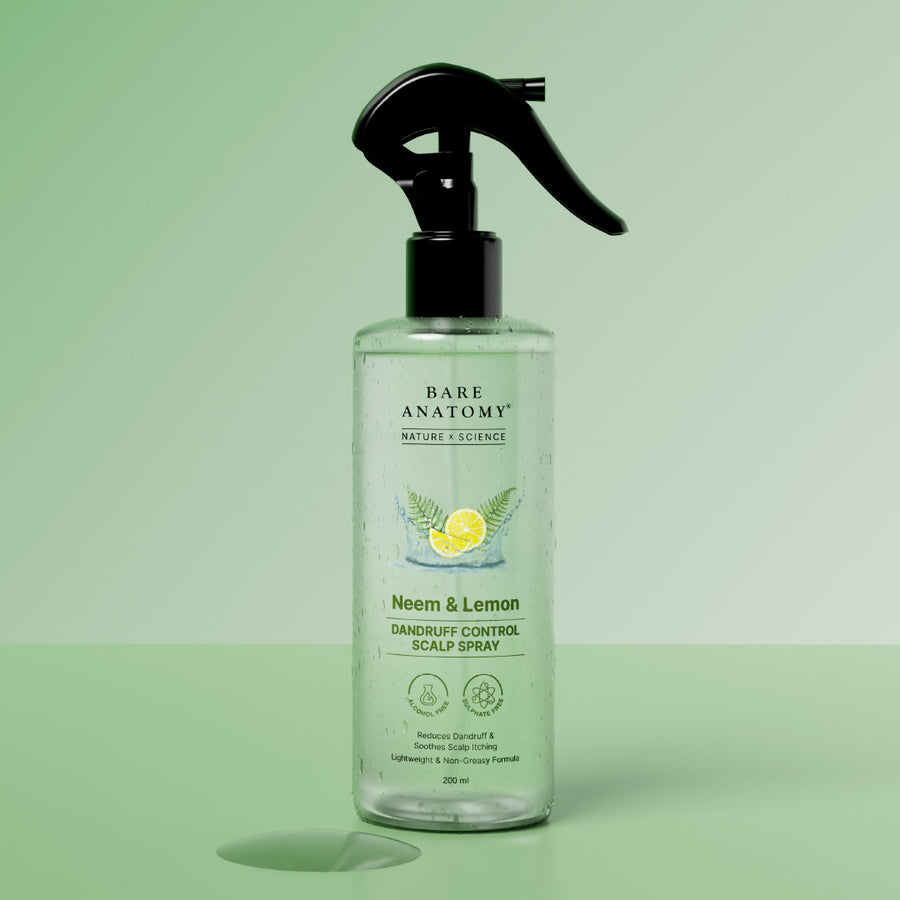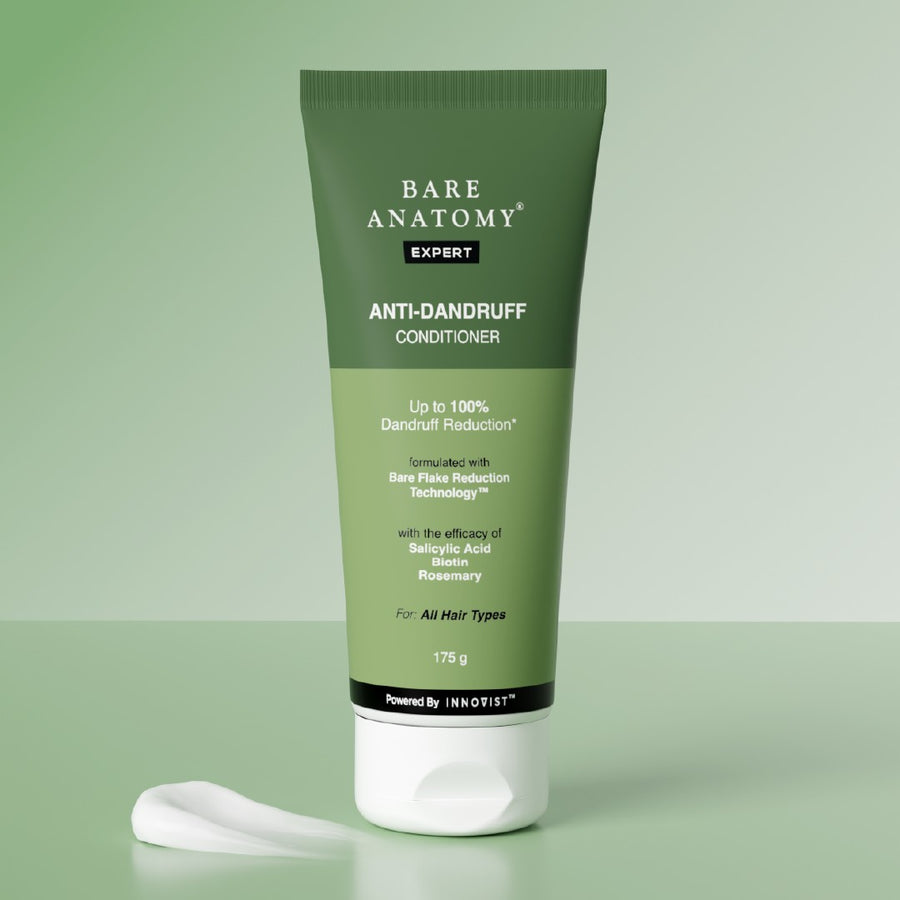
A Complete Guide to Dandruff Causes, Symptoms & Treatments
If you're reading this, you probably know more about dandruff than most persistent flakes, an itchy scalp and multiple failed “miracle” treatments. Dandruff isn’t a new issue and neither are the remedies. From home hacks to expensive formulas, the suggestions are endless. But what works for one scalp might not work for another. Some deal with dry dandruff, others with oily scalps or fungal issues. The key to treating dandruff is understanding your scalp and its specific triggers. In this blog, we’ll break down common symptoms and proven treatments to help you find what actually works for your scalp type
Dandruff Symptoms
Most people think dandruff is just a dry scalp problem that can be fixed by moisturizing the scalp with oils or masks before shampooing to wash away the flakes, but it's a more complicated condition.
Here are some common dandruff symptoms:
-
Persistent itchy scalp, often worsening after sweating
-
White or yellow flakes visible on the scalp, hair, or shoulders
-
Greasy or oily roots that show up after shampooing
-
Spots of redness or slight irritation on the scalp
-
Flakes showing up on eyebrows, beard, or behind the ears
These signs show that your scalp is responding to something more than dryness, can be an oily environment, fungal growth, inflammation, or product sensitivity. That’s why scalp treatment for dandruff that only tries to moisturize or "dry it out" tends to fall short.
It is vital to know the signs and reasons behind dandruff formation to be able to find targeted dandruff treatments that effectively target both the flakes as well as the root causes.
What Causes Dandruff?
 As discussed, dandruff may be caused by various scalp imbalances occurring together. The following are the most frequent triggers that you need to know:
As discussed, dandruff may be caused by various scalp imbalances occurring together. The following are the most frequent triggers that you need to know:
-
Fungal Growth (Malassezia)
When scalp hygiene is poor or oil accumulates, the natural fungus Malassezia breeds and degrades sebum into irritating byproducts. This can lead to inflammation, itching, and excessive dandruff. Antifungal actives like Piroctone Olamine or Zinc PCA are commonly used in effective anti-dandruff treatments to control this imbalance.
-
Hard Water & Styling Product Buildup
Hard water or excessive use of heavy styling products (such as gels, sprays, and serums) may cause residue buildup to clog your scalp. This blocks up your hair follicles and interferes with your scalp's renewal cycle. This may lead to dullness, itchiness, and flaking over time, requiring targeted dandruff shampoo and scalp detox products to remove the buildup.
-
Over-washing or Under-washing
Over-washing your hair removes the natural oils on the scalp, whereas under-washing leads to the buildup of oil and dirt. Both situations disturb the barrier and pH of the scalp, putting it in an aggravated state of flaking. Finding the optimal frequency of shampooing helps maintain the health of the scalp and supports any dandruff treatment.
-
Excess Oil & Sebum Buildup
Oily scalp types can harbour dirt, dead skin, and sweat, which provide an ideal breeding ground for flaking and itching. Buildup also nourishes Malassezia, leading to severe dandruff. For oily scalp types, a clarifying scalp treatment is usually required in order to balance sebum levels and restore equilibrium.
-
Stress & Hormonal Fluctuations
Chronic stress will cause cortisol levels to spike, influencing your scalp's oil production and immune response. The same effect can be seen from hormonal fluctuations (such as puberty or menstruation), causing an oily or dry scalp. This imbalance usually triggers flare-ups, so your usual dandruff treatments are less effective unless the root cause is addressed.
-
Weather Changes & Seasonal Triggers
Cold winters dry out your scalp, making it flaky and itchy, while hot, humid environments cause sweating and oiliness, both of which interfere with your natural scalp balance. Switching your regular shampoo or introducing a soothing scalp treatment for dandruff in your routine can help keep things in balance during seasonal shifts.
Home Remedies for Treating Dandruff
When you search for dandruff home remedies, you’ll find hundreds of DIY tricks, but not all home remedies work for every scalp. Here are a few that have shown promise in dandruff treatment at home.
1. Diluted Tea Tree Oil Scalp Treatment
Tea Tree Oil is perhaps the most extensively researched natural ingredient for dandruff treatment. It contains terpinen-4-ol, a potent compound with antifungal and anti-inflammatory properties that help to stop Malassezia-connected dandruff growth.
How to use: Combine 4–5 drops of tea tree oil and a carrier oil (such as coconut or jojoba), massage it onto your scalp, leave for 30 minutes, and then rinse. Use once or twice a week for
2. Aloe Vera Gel (Fresh or Pure Extract)
 Aloe vera is effective for sunburn, but it also contains natural enzymes and anti-inflammatory properties that can help soothe itchiness and redness on the scalp caused by dandruff.
Aloe vera is effective for sunburn, but it also contains natural enzymes and anti-inflammatory properties that can help soothe itchiness and redness on the scalp caused by dandruff.
How to use: Apply fresh aloe vera gel on your scalp and leave it on for 30 minutes before washing out with a mild, sulphate-free shampoo. Use 2–3 times a week for anti-dandruff. treatment.
3. Apple Cider Vinegar Rinse
Apple Cider Vinegar restores your scalp's pH balance to stop the chances of fungal growth and excess product buildup. Its natural acids act as a gentle exfoliant that can remove flakes without scrubbing.
How to use: Mix 1 part ACV with 2 parts water, pour onto the scalp after shampooing. Leave it on for 5 minutes, then rinse thoroughly. Do not use if your scalp is sensitive or has an open wound. You can use Bare Anatomy Anti-Dandruff Conditioner on the lengths to get smoother, flake-free hair.
4. Coconut Oil
 Coconut oil is rich in lauric acid, an antifungal and moisturising agent. It repairs the scalp barrier and also combats Malassezia overgrowth that is responsible for flakes.
Coconut oil is rich in lauric acid, an antifungal and moisturising agent. It repairs the scalp barrier and also combats Malassezia overgrowth that is responsible for flakes.
How to use: Massage warm coconut oil into your scalp, leave for 1–2 hours, and shampoo with Bare Anatomy Anti-Dandruff Shampoo for extra-long dandruff control. Do this once or twice a week for dandruff treatment.

5. Yoghurt & Honey Mask
Yogurt is full of probiotics and lactic acid that keep your scalp microbiome in balance. Honey, on the other hand, is antimicrobial and a natural humectant. It calms irritation and retains scalp moisture for effective dandruff treatment
How to use: Mix 2 tbsp plain yoghurt with 1 tbsp honey, apply to the scalp, leave for 20 minutes, and wash with lukewarm water. Use once a week for best results.
6. Bonus Remedy: 100% Pure & Natural Rosemary Essential Oil
 Rosemary essential oil is most commonly recognized for hair growth, but it's also effective against fungi that cause dandruff. It also helps to enhance blood flow to the scalp, soothe scalp itching and discomfort, and support follicle health.
Rosemary essential oil is most commonly recognized for hair growth, but it's also effective against fungi that cause dandruff. It also helps to enhance blood flow to the scalp, soothe scalp itching and discomfort, and support follicle health.
While most people turn to kitchen remedies for dandruff, Pure Rosemary Essential Oil is one natural solution that’s backed by traditional practices and science, yet still underrated when it comes to scalp treatments for dandruff.
How to use: Mix 3–5 drops of 100% pure rosemary essential oil with a carrier oil, massage onto your scalp, leave for 30 minutes or overnight, then rinse thoroughly.
Conclusion
There’s no one-size-fits-all dandruff treatment. What works wonders for one scalp might not do much for another. That’s why it’s important to go beyond just removing flakes and really understand what’s triggering your scalp issues to find the right solution.
While home remedies can offer some relief, they should always be approached with awareness. The best option is to choose targeted, science-backed formulations that support your scalp’s natural balance without causing more harm.
Also, read our blog on ways to fix an oily scalp to understand how an oily scalp is different from a dandruff-prone scalp.


































